
Will Legislature Give Another Massive Spending Increase To K12 Education?
Or Will Legislature Back Out State GPR And Replace It With Massive Amount Of Federal Aid Like Gov. Doyle Did?
Expand School Choice Income Eligibility To Open Up Popular Program To More Parents?
Ban Critical Race Theory In K12 Education?
With $2.6 Billion In Fed COVID-19 Aid To Schools, Does WI Need Evers’ Big Education Spending Increase On Top Of It?
Evers Wants A 632% Increase In Special Ed Funding On Top Of Last Budget’s Generous Increase
May 26, 2021
The Joint Finance Committee (JFC) is set to vote tomorrow on budget items related to the Department of Public Instruction (DPI), the University of Wisconsin System (UW), and the Wisconsin Technical College System (WTCS). In general, JFC will vote tomorrow on how much funding taxpayers will give to K12 education throughout the state, the School Choice and Charter School programs, Technical Schools, and our vast UW system.
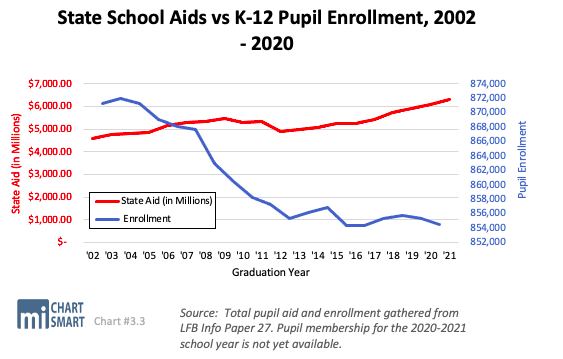
In the 2019 – 2021 state budget, DPI and K12 education received a total of $15.2 billion in funding. In that budget, JFC Republicans gave a $665 million dollar increase in total state aid to schools. On top of that increase, Governor Evers gave an additional $85 million increase over the budget as written, courtesy of his veto pen. In the 2021-2023 biennial budget, Evers wants to increase DPI’s budget to $17.3 billion.
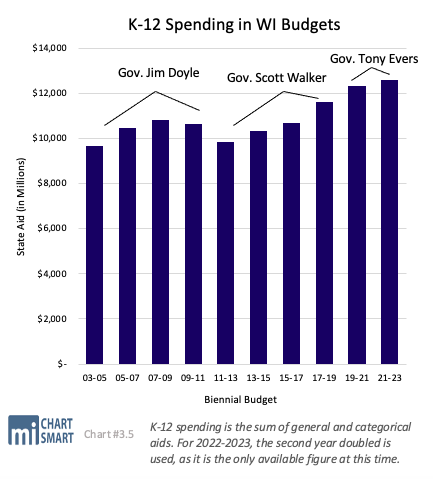
As the chart above shows, K12 education in Wisconsin has received very generous funding increases in the last five budgets. Since 2011, K12 education funding has increased by $2.7 billion. Despite what some on the far-left will say, our schools are not starving or in desperate need of a massive funding increase.
On top of this massive investment by state taxpayers, the federal government has sent a tsunami of COVID-19 and economic-stimulus aid to Wisconsin, including our schools in the last 18 months. The estimated $42 billion in federal COVID aid, coupled with a stronger-than-anticipated economic rebound from the government-imposed lockdown, has put state and local governments in a very strong fiscal position as the 2021-2023 state budget is debated. You wouldn’t know that from listening to the education establishment and the non-questioning media.
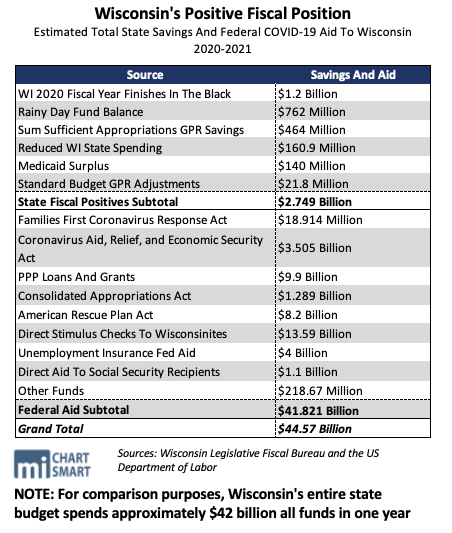
While many on the left will be quick to call for more spending for education, it is critical to point out that Wisconsin schools have directly received $2.6 billion in federal COVID-19 aid. So whatever happens tomorrow in Finance, education in Wisconsin has already received a big boost in funding. It may not be as big of an increase as the educrats and the special interests want, but it is still an increase and it is certainly not a “cut” as some Legislative Democrats will try to make it out to be.
In 2009, the last time Wisconsin was flush with a $3.7 billion dump of federal stimulus cash, former Governor Jim Doyle reduced GPR spending on K12 education by $284 million. While state government’s commitment to K12 was reduced or dare we say “cut” by $284 million, Gov. Doyle replaced it with $789 million in one-time federal school aid. The state dollars that Doyle shifted out of K12 education were distributed out to other areas of his budget that were in the red from the economic downturn.
Given the massive amount of federal aid that has been showered upon our K12 schools, there is talk by some Legislative Republicans that we should once again, just like Gov. Doyle, back out state GPR dollars so we don’t unnecessarily put extra state tax dollars on the already extra federal tax dollars.
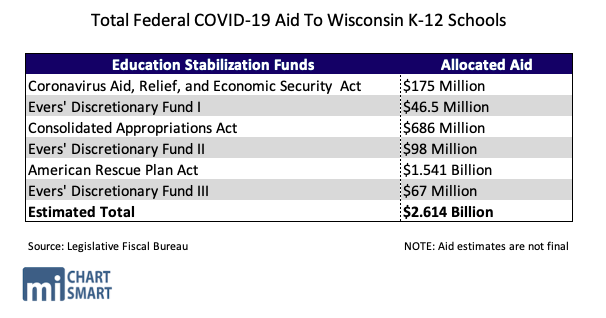
Special Education
Gov. Evers made special education a priority in his budget, increasing aid by $710 million with a reimbursement rate of 50% by 2023. Total funding for special education is currently $450 million with a reimbursement rate of 30%. To put this outrageous request into context, special education received only $97 million more in Governor Evers’ last budget. Evers 2021-2023 budget request is a 632% increase from the special education increase received in the 2019-2021 budget.
In their 2021-2023 budget request, DPI requested special education reimbursement rates to increase to 35% and 40% in fiscal years 2022 and 2023, respectively. Evers’ budget proposal jumps up to 45% and 50%. It is critical to note that Governor Evers was State Superintendent during the 2013, 2015, and 2017 biennium budgets. Why was he not requesting the kinds of categorical aid increases to special education that he is demanding now as Governor?
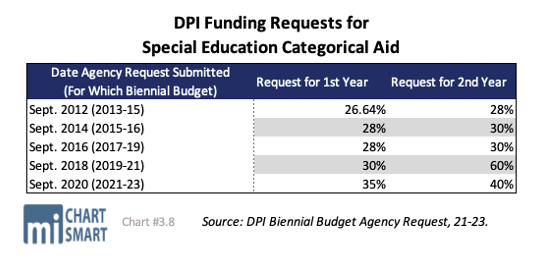
Senate President Chris Kapenga (R-Delafield) said in a recent interview that he believes there won’t be any increase in education spending due to the large amount of federal COVID-19 aid the state has received. “I think we’re good for right now,” Kapenga said. “My gut is there’s not going to be a big push in the caucus to increase funding.”
That being said, MacIver staff has heard from multiple sources at the Capitol that JFC Senate Republicans are pushing for $100 million more to special education this budget, which indicates that the issue may be an area of contention between the two houses.
Even as Wisconsin has pumped massive spending increases into K12 education, student proficiencies have not increased across the state. District Report Cards were not completed last year because of the pandemic, but the most recent data shows that students are actually decreasing in proficiency in English Language Arts. Math proficiencies have remained virtually unchanged over the past three years. Given the large increase in education funding the last five budgets, we should be asking why haven’t test scores and proficiency rates increased?
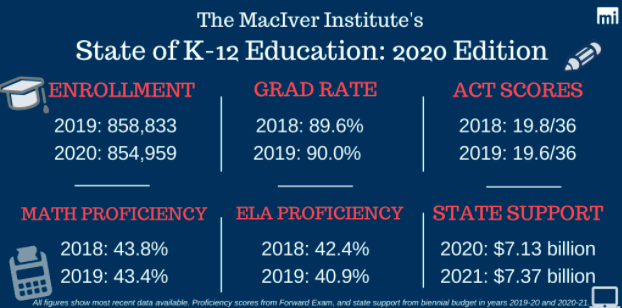
Parental Choice Programs
Evers has also proposed, for the second budget in a row, to halt enrollment in Wisconsin’s school choice programs, despite the statewide popularity of the programs. Beginning in 2023, his budget would freeze enrollment at 2022 levels in the Milwaukee, Racine, and statewide programs. He would also freeze enrollment in the Special Needs Scholarship Program (SNSP). In addition to capping SNSP enrollment, the budget would also require that new schools entering the SNSP to participate in another choice program at the same time. DPI did not include any of these changes in its agency budget request but actually proposed numerous small changes that school choice supporters have asked for.
Evers’ strict enrollment caps were removed from the budget early on by JFC Republicans along with approximately 400 other policy items. Currently going through the legislative process is Assembly Bill 59, which would increase the income eligibility for choice programs from 220% of the federal poverty level to 300%, opening this program up to more parents looking for a different educational environment that better suits the needs of their children. Will JFC Republicans try to incorporate AB 59 into the state budget?
University of Wisconsin and Technical College Systems
Evers’ proposed budget would increase UW System funding by $299 million over the biennium, for a total of $13.24 billion all funds. That’s a 2.3 percent increase over current spending. Total positions at the UW System would increase by 51.52 full-time equivalents, a 0.10 percent increase. Currently, the UW System has over 35,000 government employees. The current budget for the UW System stands at $12.92 billion. Evers proposes an over $191 million GPR increase to the UW budget, which is a 10.3% increase compared to fiscal year 2021. The Governor has also proposed continuing the very popular tuition freeze.
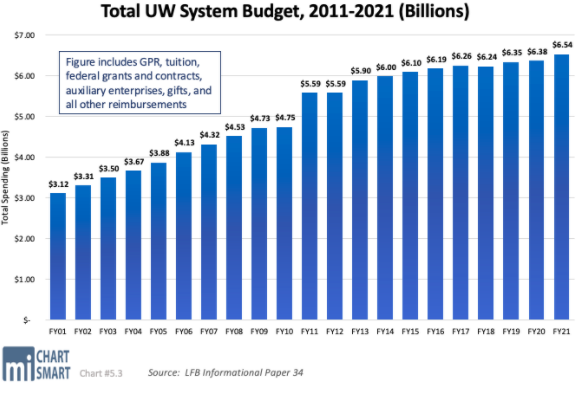
Finally, JFC will also deliberate the budget proposal for the Wisconsin Technical College System tomorrow. In his first budget, Governor Evers passed a $25 million increase in WTCS’ biennial GPR aid, bringing biennial state aid to $202.07 million. This was the first time WTCS received an increase in state general aid in several budgets. In his 2021-2023 budget, Evers has proposed an additional $36 million general aid increase to WTCS, 44% more than last budget’s increase and $12 million more than what WTCS had originally requested.
Be sure to follow @MacIverWisc on Twitter for live updates as JFC begins their voting.